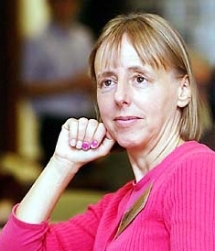
Colonel Anne Wright

Medea Benjamin is Founding Director of the human rights group Global Exchange and the women's peace group CODEPINK
Decision to bar U.S. activists draws fire
WASHINGTON — A day after two U.S. anti-war activists were barred from entering Canada, the reasons for their rejection remained unclear.
Barring entry to anti-war activists is “absurd,” NDP MP Olivia Chow said Thursday after two U.S. women, both with long records of non-violent protest, were turned away by Canadian border guards.
Ann Wright, a retired U.S. army colonel and former diplomat who quit in opposition to the Iraq war, and Medea Benjamin, co-founder of Code Pink, a women's peace group, were refused entry this week, apparently because their names have been added to an FBI database.
“These are not terrorists; why do we have to protect Canadians from them?” said Ms. Chow, who represents the Toronto riding of Trinity-Spadina. “We should not be allowing the FBI or Mr. Bush to dictate our entry policy.”
Stockwell Day, the Minister for Public Safety, who is responsible for the Canada Border Services Agency, said: “I can't give you details on specific cases,” when asked about the activists. “I can tell you that our border officers do everything within their mandate to make sure that our borders are safe.”
Both activists, clad in pink and backed by anti-war supporters holding banners, held a news conference outside the Canadian embassy in Washington Thursday.
They said they were astonished that the names of anti-war activists convicted of misdemeanours – such as trespass, the offence routinely used to clear peaceful protesters – had been added to the FBI's National Crime Information Center database.
“This is outrageous. I'm appealing to Canadians not to treat peaceful activists like common criminals,” Ms. Benjamin said.
“I travel all over the world on a regular basis and Canada is the first country to use the NCIC to keep out people like us,” said the veteran activist and founding director of Global Exchange, an international social justice movement.
Both women have previously visited Canada for anti-war meetings, sometimes at the invitation of Canadian activist groups or political parties.
Canadian border agents have access to the FBI's database. The border agents at the Rainbow Bridge at Niagara Falls who barred Ms. Benjamin and Ms. Wright said the mere fact that they were listed on the NCIC was sufficient to bar them from entry.
“The people at the border were almost apologetic. …One of them said he thought the war was terrible,” Ms. Benjamin said. She said the Canadian immigration official told her that he had no choice. “He said it wasn't up to him.”
In Ottawa, border agency spokesman Chris Williams denied that simply being listed on the FBI's NCIC database would automatically bar someone from entry to Canada.
“Entry is always judged on a case-by-case basis,” he said.
However, the actual basis for denying entry to anti-war activists remained unclear.
FBI spokesman Paul Bresson said the NCIC is simply a database provided by local and state police forces. He confirmed that some forces might file reports about individuals arrested from non-violent political protests while others might not.
“It's a clearinghouse of information shared with law enforcement,” he said.
The two activists met with a diplomat at the Canadian embassy in Washington Thursday. They were given “no apology and no invitation to Canada,” Tristan Landry, a spokesman for the embassy, said.
He told us “we were not even eligible for rehabilitation,” Ms. Wright said. That process requires a would-be entrant to wait five years, complete a questionnaire and pay hundreds of dollars in fees.
“It's absurd,” Ms. Chow said.She added that activists, both pro- and anti-war should be free to enter Canada.
With a report from Gloria Galloway in Ottawa
No comments:
Post a Comment